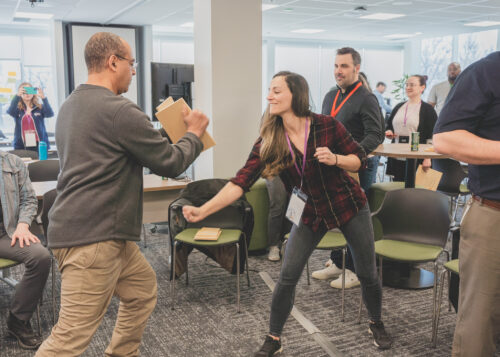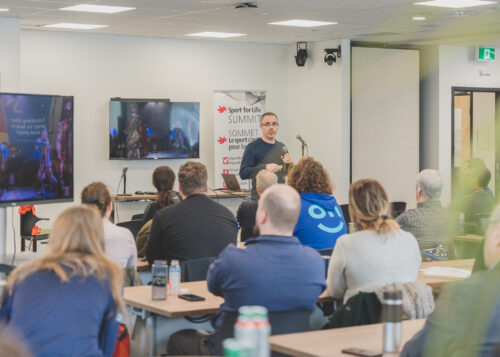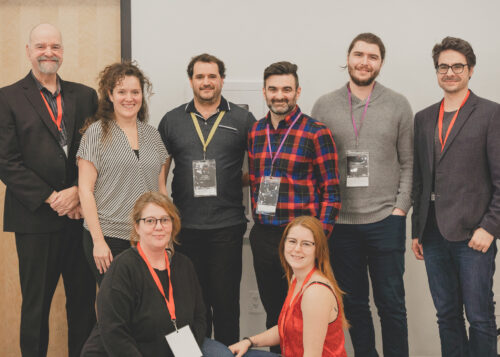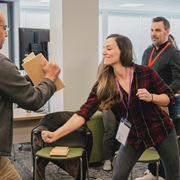Montreal Summit hosts sell-out Francophone crowd

The organizers of this year’s Sport for Life Summit in Montreal are still glowing after a sold-out event of 170 delegates that featured hard-hitting talks on the importance of safe sport, how to create a collaborative environment and breaking through unconscious biases.
Held at Maison du loisir et du sport and organized by Réseau Accès Participation in collaboration with Sport’Aide, Réseau des unités régionales de Loisir et de Sport and Champions for Life, the Summit attracted quality sport and physical literacy professionals for multiple days of presentations in French, with a focus on equity, diversity, inclusion and accessibility – making it the biggest Sport for Life-affiliated Francophone event since our organization’s creation in 2005.
“When I first attended the Summit in Gatineau many years ago, we had a few French presentations but not a lot of attendance. Moving forward over the years, we decided to organize and introduce a Francophone day as more and more French-speaking people began coming, but we hadn’t yet developed our network; it was growing slowly as we created new partnerships,” said Kim Samson, Sport for Life’s Manager of PL4C and Francophone Engagement.
In 2022, the first Quebec Summit was held in Lanaudière, which organizers felt was a step in the right direction but was impacted by COVID-19 and other factors. The following year they made the decision to move the Summit to Montreal, where most of Sport for Life’s partner organizations are based, and partner Réseau Accès Participation was able to help with their bigger network in Quebec – ultimately quadrupling participant numbers.
Samson figures this bodes well for the ideals of quality sport and physical literacy being further established in Quebec, and the French-speaking world.
“For me it was a tremendous success. We now see that Sport for Life concepts in Quebec are becoming more embraced and integrated, and physical literacy and quality sport are being more universally implemented, which is a really good feeling.”
Thriving through Changing Times
When Mariane Parent and Pierre Morin of Réseau Accès Participation first sat down to organize the Montreal Summit, one of the first things they did was consider the theme – “Thriving through Changing Times”. Though this overarching theme was intended to encapsulate all of the events being hosted in various Canadian communities from coast to coast to coast, they wanted to ensure they had a distinctly Francophone interpretation in mind.
“We took this to the organizing committee and we actually had two meetings saying ‘what does this mean in Quebec?’ So I think that’s a key point for other Summits that we’ll have in the future is that we take the main theme and work around it and brainstorm how it fits in our province. How does it fit into our French way of doing things? How can you speak to the right challenges so that people learn from it and they grow?” said Parent.
“We could just go ‘physical literacy, who wants to speak about it?’ but if you have a main goal you want to address, I think that’s how the program was built. And people wanted to come because it meant something to them.”

Ultimately, the team decided to zero in on themes surrounding equity, diversity, inclusion and accessibility – with a special focus on violence and abuse in sport, since Sport’Aide (an organization focused on safe sport) was a key participant in the program development. As the organizing committee built their schedule, they aimed to have gender parity and representatives from equity-deserving groups.
One of the goals of the Summit is to mobilize knowledge, with a focus on key terms. Parent feels that the term “physical literacy” is gaining favour as more and more people become aware of how it can be a catalyst for change within the system. Since it’s the foundational concept behind Sport for Life, it’s key to share with the Quebec population.
“There is a lot of momentum right now. I think the term ‘literacy’, not just ‘physical literacy’, is being used more and more. So big researchers are coming out with this term and other concepts of social well-being. We have literacy in agriculture, we have literacy in food and nutrition, we have literacy in technology. More and more people are becoming aware of what it means, which is a big difference from 10 years ago,” she said.
“In the past, the term ‘physical literacy’ wasn’t used as much and people were reluctant to embrace it, but I think as years have passed more and more people expect us to use that term. So I think it’s just a matter of time. A lot of people want to see a change now that we’re post-COVID and want to do things differently.”
Parent felt that hosting the event at Maison du loisir et du sport was a huge part of the Summit’s ultimate sell-out success.
“It’s a beautiful new building for sport and leisure federations in Quebec. It’s a five-storey building that is brand new, so people wanted to see the venue where it was going to be held. I think the two best ideas were holding the Summit there, and holding it in downtown Montreal at a place where all of these professionals actually work.”
A trifecta of French voices
The first keynote presenter to take the stage in Montreal was Quebec cyclist Geneviève Jeanson, who joined the Sport’Aide team last October alongside Paralympian Cindy Ouellet and National Football League player Antony Auculair as a co-spokesperson for the prevention of violence in sport. Jeanson shared her story of being caught for doping and escaping an abusive coach. She recounted how she turned her life around following the controversy, ultimately returning to her post-secondary education. Jeanson showed delegates how violence and abuse can push an athlete to the point of abandoning their passion, and emphasized the importance of surrounding yourself with the right people and creating the right environment to thrive.
According to Parent, this got the event off to a positive start by demonstrating that difficult subjects could be explored in an impactful way.
“Geneviève has a story that’s very close to Quebec, because she was well known as an athlete and we saw her fall when the drug allegations came in back in the early 2000s. After that, she came out and said ‘well actually, that was because of abuse’ so when Sport’Aide said we could put her on the agenda as the opening keynote we knew we could attract a lot of people who wanted to learn more about her story,” she said.
The next keynote was André Lachance, a long-time Sport for Life quality sport expert. He spoke about how to develop a positive organizational culture. Speaking from his experiences with Baseball Canada, as well as his work with Cirque du Soleil, he challenged delegates to examine innovative practices from around the world and consider whether they could be incorporated into their own work in Quebec and beyond.
For Thomas Jones, Sport for Life’s Director of Community and International Engagement, Lachance’s talk gave the Summit an international flavour.
“André is always a dynamic and inspiring speaker with a lot of sport knowledge from all around the world. At Sport for Life, we’ve been working with him for many years and know that he’s one of the most forward-thinking professionals working in quality sport today,” he said.

The team at Réseau Accès Participation
That was followed by a talk from David Arsenault, former national Taekwondo champion and executive director of Champions for Life, who shared about a violent sexual assault that he endured at the hands of an adult during a sleepaway camp at the age of 12.
He continued his presentation by sharing how sport ultimately saved him, and how he’s built a community around his interest in Taekwondo to serve and protect others, as well as creating a foundation dedicated to transforming the lives of children. At one point he had his son Éric, a Black Belt, lead a group of Taekwondo children in a wood-breaking demonstration.
To close the keynote, all delegates were given a piece of wood on which they had to write a personal challenge that they wished to break through with their fist – an activity that was emotionally powerful for many.
Thinking globally
Jones felt the Quebec event was distinct from its English counterparts and showcased a uniquely Francophone approach to the concepts being discussed.
“From what I saw during the conference, our materials and our concepts are quite welcome in Quebec but perhaps need to be circulated a little more. The approach in Montreal was unique and worked well, speaking to topics that were very relevant including inclusion, under-privileged kids, innovation, culture and how to integrate girls and women better into the sport system,” he said.
“You could tell there were a lot of connections being made and exciting announcements coming out, such as KidSport launching a new branch in Quebec. There was a pride and respect that the Quebecois had for hosting in Quebec.”
Organizers were floored and delighted when Francophone sport celebrity Pierre Lavoie registered as a delegate, and participated in a number of the talks. It was a signal to Sport for Life that the event was being taken seriously by heavyweights from within the quality sport and physical literacy ecosystem. For Samson, the full house and the enthusiastic reception meant a lot.
“It means that the Summit in Quebec is legitimate, that it has a great impact and that sport organizations see a huge value in what we offer.”

